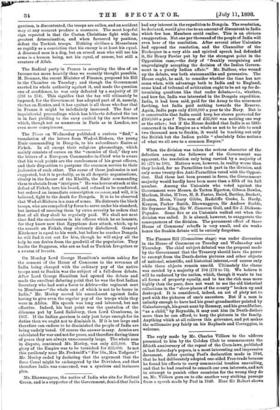Mr. Bhovrnaggree, the native of India who sits for Bethnal
Green, and is a supporter of the Government, denied that India
had any interest in the expedition to Dongola. The resolution, he declared, would give rise to an amount of discontent in India which few hon. Members could realise. This is an obvious exaggeration. Not one per thousand of the people of India will even hear of the resolution. After several other Unionisha had opposed the resolution, and the Chancellor of the Exchequer in a very able and spirited speech had defended it, Sir Henry Fowler put by far the strongest point in the Opposition case,—the duty of "frankly recognising and, ungrudgingly accepting the decision of the Indian Govern- ment in a purely Indian affair." Mr. Balfour, who wound, up the debate, was both statesmanlike and persuasive. The House ought, he said, to consider whether the time has not come when, with advantage both to India and to England;.. some kind of tribunal of arbitration ought to be set up for de- termining questions like that under debate,—i.e., whether, and how far, India was interested in the Dongola expedition. India, it had been said, paid for the Army to the uttermost farthing, but India paid nothing towards the Reserve. Again, India pays only £100,000 a year to the Navy. But is- it conceivable that India could keep her shores protected for £100,000 a year ? The sum of £35,000 was nothing one way or the other; but if the House decided that India is so little concerned in the Empire as a whole as not to be able to send two thousand men to Suakin, it would be teaching not only the British but the Indian public "absolutely false notioes. of what we all owe to a common Empire."


































 Previous page
Previous page